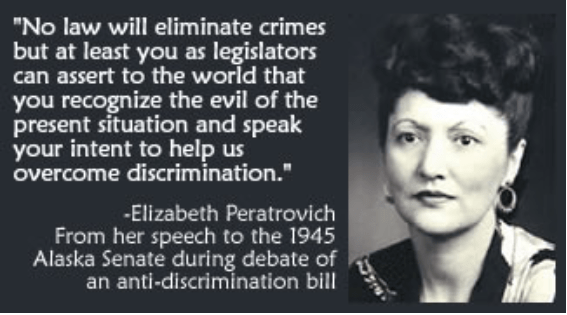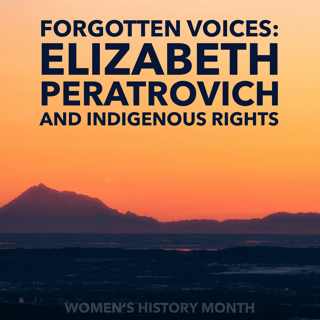This month we are focusing on forgotten voices of women who have made great change and impacted society in a unique way, whose accomplishments have been overlooked. Elizabeth Peratrovich advocated for civil rights, particularly for the Indigenous population and played a huge role in creating the first anti-discrimination bill in the United States.
Elizabeth was born a member of the Tlingit nation in 1911 in Alaska; at a young age she lost both her parents, was adopted by the Wanamakers, and given the name “Elizabeth Jean.”. Throughout her life there was blatant discrimination against the Tlingit nation in the territory. Indigenous people were limited on where they could receive medical care and go to school, even which dining establishments they could go to. There was also hatred shown towards Indigenous people from the white population in the area. From signs saying ‘No Natives allowed’, ‘No dogs, no Natives’, to ‘We cater to White trade only’, discrimination was inescapable.
A few years after marrying Roy Peratrovich, also from the Tlingit nation, they moved to Juneau; this was where her fight for equal rights became regionally recognized. She wrote to the elected governor about the sign ‘No Natives allowed’ that she and her husband had stumbled across, expressing her outrage that it would exist after World War II. Elizabeth gained the support of Governor Gruening for an anti-discrimination law, but the first time they tried to pass the bill in Alaska in 1943, it did not pass the House. Elizabeth toured around Alaska working to gain support from fellow Indigenous people to ensure its passing the second time. In 1945, the anti-discrimination bill was re-introduced, and was the first of its kind to passed by the senate in an 11-5 vote. This bill called for entitlement to equal enjoyment of services and establishments. For example, restaurants, roller skating rinks, bathrooms, and transportation are just a few that were specifically listed in the bill. Elizabeth was a huge reason why this anti-discrimination bill was passed when she gave pivotal testimony stating,
“”Have you eliminated larceny or murder by passing a law against it?” Peratrovich asked matter-of-factly. “No law will eliminate crimes, but, at least, you as legislators can assert to the world that you recognize the evil of the present situation and speak your intent to help us overcome discrimination.” (Bohi, 2009)
This anti-discrimination bill created a invaluable guide on future bills to come in the Civil Rights movement in the 1960s. While Elizabeth did pass away in 1958, she was an inspiration that proudly raised her voice and acted against discrimination not only for herself, but other Indigenous people as well. In 1988, Alaska legislature deemed February 16, the “Annual Elizabeth Peratrovich Day” in honor of her fight against discrimination, and she is still recognized to this day. Elizabeth was brave to speak against discrimination in that time, and paved the way for many others to come.

Washington.edu
References:
Bohi, H. (2009). Below the radar: virtually unknown heroes of Alaska. Alaska Business Monthly, 25(4), 134–.
Hoffman, K. (2020). “Elizabeth Peratrovich- Leadership qualities”. Indigenous Leaders and Activists. Washington University. Retrieved from http://faculty.washington.edu/jlreid/wordpress/2020/03/05/elizabeth-peratrovich-leadership-qualities/
Weingroff, R. (Updated 2021). “Who Is Elizabeth Peratrovich? The story behind the country’s first anti-discrimination law”. Retrieved from https://www.fhwa.dot.gov/highwayhistory/peratrovich.cfm.
Written by Olivia Stueben, Outreach Intern
All ZCenter blog posts are written by state certified staff, interns, and volunteers. For questions on authorship or content, please email kjones@zcenter.org.

